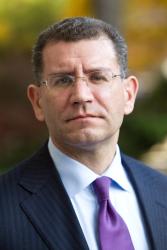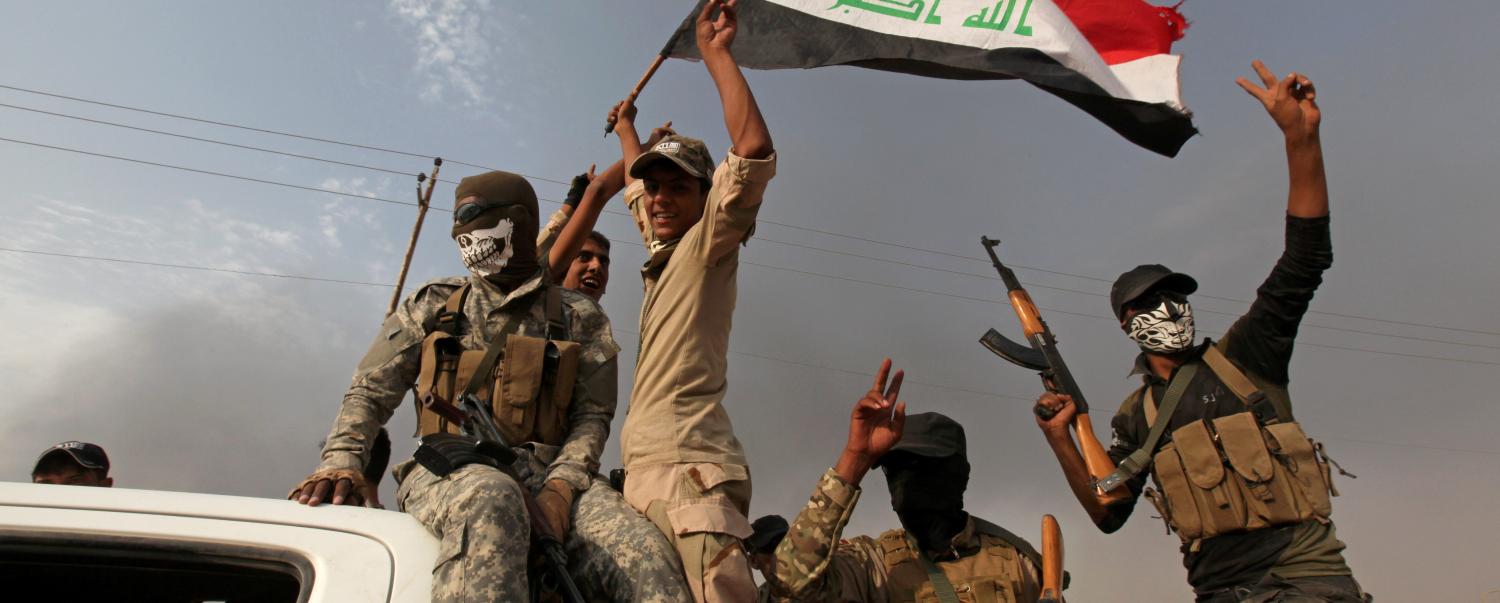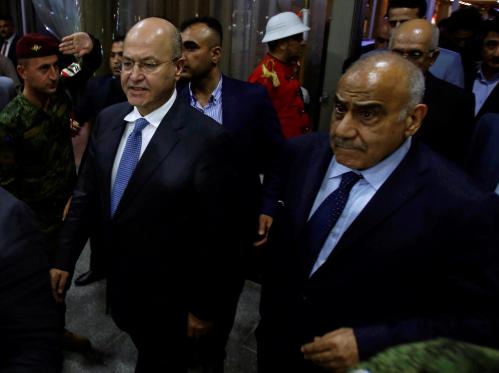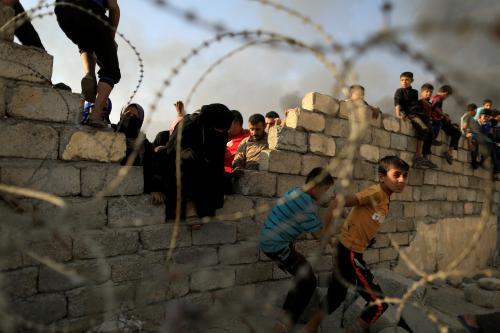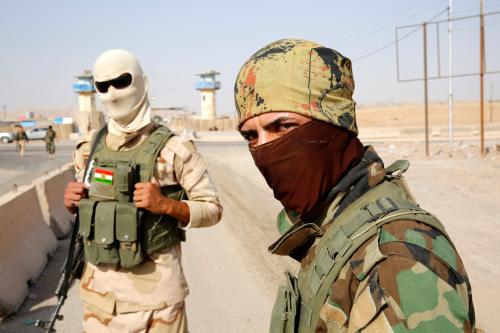The following brief is part of Brookings Big Ideas for America—an institution-wide initiative in which Brookings scholars have identified the biggest issues facing the country and provide ideas for how to address them. (Updated January 26, 2017)
 During the 2016 presidential campaign, Donald Trump excoriated President Obama for prematurely disengaging from Iraq and so plunging it back into civil war. President Trump will now have the ability, and the responsibility, to avoid repeating Obama’s mistake. However, doing so is going to require treating Iraq as more than just a host for ISIS—let alone a gas station to be robbed—and instead enact policies that will help Iraq to slowly heal the wounds that allowed ISIS to spawn there. That isn’t as hard as it sounds, but it will require the new administration and its principal officials to see Iraq in a very different light.
During the 2016 presidential campaign, Donald Trump excoriated President Obama for prematurely disengaging from Iraq and so plunging it back into civil war. President Trump will now have the ability, and the responsibility, to avoid repeating Obama’s mistake. However, doing so is going to require treating Iraq as more than just a host for ISIS—let alone a gas station to be robbed—and instead enact policies that will help Iraq to slowly heal the wounds that allowed ISIS to spawn there. That isn’t as hard as it sounds, but it will require the new administration and its principal officials to see Iraq in a very different light.
What needs to be understood is that Iraq is caught in a quintessential ethno-sectarian civil war. It is not the case that Iraq is in civil war because ISIS is there; it is instead the case that ISIS is there because Iraq is in civil war, and eliminating the former will mean confronting the latter. Unfortunately, however, American policy toward Iraq has been badly misguided because it has attempted to address one of the symptoms of the civil war—the rise of ISIS—without addressing the dynamics of the civil war itself.
Civil Wars and the Lessons of History
The modern world has a great deal of experience with civil wars, and one of the stark lessons of this history is that civil wars do not lend themselves to half-measures. While it is entirely untrue that external actors cannot end a civil war, as is often claimed, such wars cannot be ended easily. History demonstrates that half-hearted interventions do not quell a civil war: they exacerbate it.
There is essentially only one approach that a well-meaning external actor can take to end someone else’s civil war. Very crudely, the approach requires three steps: (1) changing the military dynamics such that none of the warring parties believes that it can win a military victory, or that it will be slaughtered by one of its rivals if it lays down its arms; (2) forging a power-sharing agreement by which political authority and economic benefits are divided more or less in keeping with demographic realities; and (3) establishing at least one internal or external institution that is capable of ensuring that the first two conditions endure until trust among the communities and strong internal institutions can be rebuilt. There are multiple ways to handle each of these tasks, but any intervening nation that does not pursue this course of action, that does not bring enough resources, or that is not willing to sustain its commitment long enough to succeed will only make the situation worse.
Consequently, the minimalist approach to Iraq that the United States employed under the Obama administration is highly unlikely to secure American interests there over the long term. The military progress has been admirable, but without comparable political progress along the lines required to end a civil war and prevent its recurrence the exertions so far are likely to prove ephemeral. For Iraq, destroying ISIS and then leaving the country to the Iraqis to sort out their own political problems will not do it. The Iraqis are capable of addressing their myriad problems, but only with American assistance. Unless the United States wants to fight yet another war in Iraq in the near future, the incoming administration needs to be willing to deepen America’s role there.
The Big Picture of a New Iraq Policy
One of the big dangers in Iraq for the new administration is overcoming the false sense of security that ISIS is now effectively defeated and therefore there is nothing more to worry about in Iraq. While the military campaign to evict and eradicate ISIS in Iraq and Syria seems well in train, it cannot be the end of America’s involvement. If Washington repeats the same mistake it committed in both 2003 and again in 2011 by ignoring the political requirements to translate a successful military campaign into an enduring foreign policy achievement, none of the gains are likely to prove lasting. Iraq is likely to fall apart all over again, and President Trump will then face the same frustrating choice of paying the costs to stabilize Iraq yet again or running the potentially catastrophic risks of trying to walk away as both of his predecessors did.
Indeed, if the final eviction of ISIS is not handled properly, it could simply create the circumstances for more widespread conflict. Right now, fear and hatred of ISIS is perhaps the only thing that all Iraqis have in common. The danger is that if it is removed without establishing a process of national reconciliation—or better still, an actual accord—that gives Iraqis faith that their polity remains viable, the civil war will reignite and will shift from a fight of all against ISIS to a fight of all against all.
Iraq’s first great problem now is that its communities have once again lost their trust in one another. Trust is always the first casualty of civil war, and Iraq had only started to rebuild it in 2007–9 before the American withdrawal allowed Prime Minister Nouri al-Maliki to pursue a sectarian agenda and strip Sunni trust of the Shi’a all over again. After the fall of Mosul, rebuilding that trust must be a top priority. In part for that reason, Iraq will almost certainly need to transition eventually to a combination of federalism and either confederation with the Kurds or independence for an Iraqi Kurdish state.
With regard to the latter, the Kurds constitute a separate nation, and they have made clear for the past century that they do not want to be a part of Arab Iraq. Their forced inclusion in the Iraqi state has resulted in nothing but conflict and misery for both the Kurds and the Arabs. Iraq and the Kurds would both be better off with an amicable divorce, but ensuring its amicability will take time, goodwill, and constructive diplomacy that seem in short supply right now. The United States has important interests in seeing this separation happen peacefully, but little else. The ways in which the Kurds and Arabs will choose to handle territorial issues (including the status of Mosul and Kirkuk), the distribution of oilfields, and the return of displaced persons are not issues on which the United States needs to take a position, but it will be critical that Washington serve as honest broker in helping the parties find solutions that both can accept. It may also be necessary for the United States to help each side make painful concessions, in part by providing bilateral or multilateral aid as compensation. Allowing the Kurds to opt out of Iraq would also increase the demographic and therefore electoral weight of Iraq’s Shi’a Arab community, which will make it all the more important for the United States to help Arab Iraq devise a more stable, equitable, and self-regulating political system of its own.
For this reason, and because the opposite approach had failed miserably by 2014, paving the way for ISIS, Arab Iraq will have to develop a federal structure (as envisioned in the current Iraqi constitution) that delegates greater authority and autonomy to its various ethnic, sectarian, and geographic components. The traumatic experiences of three-and-a-half decades of Saddam Hussein’s tyranny, two bouts of civil war, and Maliki’s brutal attempt to consolidate power in between, have made it inconceivable that Iraq’s communities will accept a return to an all-powerful, highly centralized Iraqi state.
However, in fittingly ironic fashion, the goal of a more decentralized, federal political system now requires a dedicated effort to strengthen Iraq’s central government. The problem is best understood this way: Decentralization can take two forms, empowerment or entropy. Obviously, the former is a positive form that can produce a functional state; the latter a disaster likely to produce war and misery. Decentralization via empowerment requires a reasonably strong and functional central government that grants specific authorities and the power to execute those tasks to subordinate and/or peripheral entities. Decentralization via entropy, in contrast, occurs when the central government lacks the strength to control its constituent parts—let alone to empower them—and so subordinates, peripheral entities, and actors outside the system altogether simply grab authority and resources and do with them whatever they like. Not only does such anarchy invariably dissolve into chaos and conflict, but the actors arrogating power to themselves also are rarely as strong as they would be if their power was delegated by an effective central government. One example of the distinction is the United States created by the Articles of Confederation compared to the United States created by the U.S. Constitution. Under the former, the central government was too weak and so the federal structure did not work, even though the states were far more powerful than they were under the Constitution. The result was anarchy, chaos, and internal conflict. The Constitution provided for a stronger central government, which paradoxically made a stable federal system—with still strong states—both possible and practical.
Unfortunately, what is happening in Iraq today is largely decentralization by entropy, not empowerment and…that is likely to produce renewed conflict in the future.
Unfortunately, what is happening in Iraq today is largely decentralization by entropy, not empowerment, and this is the second, related factor that is likely to produce renewed conflict in the future. It is this entropic pull that is causing the fragmentation that is now the leitmotif of Iraqi politics. The Sunnis have long suffered from a badly atomized leadership, but even that has worsened in recent years, exacerbated by Maliki’s brilliance in targeting any moderate, capable, and charismatic Sunni leader who might have unified that community. But now the Kurds, whose leadership once consisted of Mas’ud Barzani (head of the Kurdistan Democratic Party [KDP]) and Jalal Talabani (head of the rival Patriotic Union of Kurdistan [PUK] party) and no one else, are now increasingly beset by divisions. The long-dormant KDP-PUK split has been reopened, to be joined by a split between the KDP and the opposition Gorran (“Change”) movement, and splits within each of these parties as well. Even the Shi’a leadership is fracturing. Iraqis often like to argue that the Marja’iye (the Shi’a religious establishment centered in Najaf) provides the Shi’a with a unified voice, but if that were ever true, it is proving less and less so. Now, dozens of Shi’a figures can claim leadership over important constituencies, including dozens of new militias, many of which operate outside the control of the central government. This centrifugal trajectory simultaneously paralyzes the Iraqi political system and pushes the country toward chaos and renewed conflict.
Specific Steps for Post-ISIS Iraq
In this context, a new American policy that would have a reasonable prospect of helping Iraq to avoid slipping back into civil war once ISIS is defeated will require the United States to pursue a number of interwoven courses of action.
Forge a New National Reconciliation Agreement
There is simply no way around this foundational requirement. Iraqis need a new power-sharing agreement that will allow all of the rival communities, but particularly the Sunni and Shi’a Arabs, to begin cooperating again. Without this, the military successes against ISIS will evaporate. In recent months, both the United States and the government of Iraq have trumpeted local reconciliation efforts as a bottom-up substitute for a top-down process of national reconciliation. While such grass-roots efforts can be very useful, historically they are no substitute for high-level reconciliation. Without the latter, local efforts are typically undone by rivalries among senior leaders and the result, once again, is renewed civil war. Yet the United States has made far too little effort to bring Iraq’s senior leadership together, hiding behind Baghdad’s desire to handle this matter itself and the self-fulfilling prophecy that Iraq’s leaders are too fragmented. The current Iraqi-led “process” has so far achieved nothing. On the other hand, it is worth noting that in 2007–8, Ambassador Ryan Crocker faced a similar problem of fragmented leadership, yet he and his team brokered exactly the kind of informal but effective national reconciliation that Iraq desperately needs once again.
Push Baghdad and Erbil Toward Short- and Long-Term Solutions
As noted above, it would be better for both Arab Iraqis and Iraqi Kurds if Iraqi Kurdistan were a separate country. Unfortunately, getting to that point without large-scale violence will be very difficult. There are borders to be negotiated, populations to be consulted, and foreign powers to be placated (or stonewalled). Moreover, in the near term, Kurdish political, economic, and security needs may require a closer relationship with Baghdad rather than a more distant one. The Obama administration has put considerable effort toward handling these immediate problems and has helped achieve a certain amount of success. However, without the framework of a long-term plan that creates the circumstances for peaceful Kurdish secession (along the lines of the Czechoslovak model), these near-term gains will erode and eventually collapse as they have so regularly in the past.
Help Baghdad Regain the Basic Capacities of Governance
Even the most extreme advocates of federalism in Iraq recognize that the central government will have to retain certain powers and prerogatives because they are responsibilities that only the central government can realistically discharge. This starts with the role of defending Iraq from external attack and helping its governorates and regions defend themselves against major internal security threats. It means helping Baghdad regain its Weberian monopoly on the use of violence, including demobilizing the Hashd ash-Shaabi (the militias created in 2014 after the fall of Mosul) and/or integrating them into the formal Iraqi security forces. Only after such a reform program will the central government be able to delegate part of its security authority to the internal security forces of its governorates and regions. Strengthening the central government would also give Baghdad the ability to conduct basic functions like gathering revenue and spending it on nationwide services such as power generation and distribution, infrastructure improvements, and economic development—functions that everyone accepts Baghdad will have to retain. That, in turn, requires both wider political reform to ensure a more functional central government overall and more specific reforms to address Iraq’s paralyzed legislature, its corrupt executive branch, and its politicized judiciary.
Strengthen the Abadi Government
The United States can provide Iraq with guidance and some resources to enact the kinds of reforms enumerated above, but most of that work can only be undertaken by the Iraqi government itself. This places a premium on helping the Iraqi government as best we can and far more than we have over the past eight years, which also raises the question of whether the United States should support the current Iraqi government or push for a different one. Although Haider al-Abadi has made mistakes as prime minister, he is still the best we are likely to get. Of greatest importance, he has a number of highly desirable qualities: He is politically courageous, he is not corrupt (as best anyone can tell), he has a clear and correct sense of what Iraq needs to do to escape the civil war trap, and he has shown a willingness and an ability to learn from his mistakes. We could have done a lot worse than Haider al-Abadi. Moreover, replacing him would be more likely to bring to power a worse leader than a better one. Consequently, Washington’s best bet will be to double down on Abadi in the expectation that greater American backing and partnership will enable him to pursue the national reconciliation and political reform that Iraq so desperately needs and that he has repeatedly called for. But that means keeping American skin in the game.
Develop a Robust, Long-Term Aid Program for Iraq
The Obama administration has proven that its early refusal to invest resources in Iraq—and its perverse claim that doing so was senseless because the United States had no influence there—was wrong. Since 2014, the United States has invested considerable resources in Iraq, including 5,000 ground troops, large-scale weapons deliveries, a major air campaign, and significant financial assistance, and as a direct result now has considerably more influence than at any time since 2011. After the fall of Mosul, the United States should maintain this commitment of resources to Iraq. Ideally, the United States would decrease some aspects of its support, like airstrikes and other fire support, and increase other elements to focus more on the political and economic tasks that need to be accomplished after the defeat of ISIS, which arguably are more challenging than the military task of liberating Iraq.
Retain and Rebuild the American Military Presence
Ideally, the United States would keep about five to ten thousand ground troops in Iraq. In terms of missions, these personnel are needed to thoroughly rebuild the Iraqi Security Forces—as the United States finally did in 2007–9—with large numbers of U.S. personnel training, advising, partnering with, and accompanying Iraqi forces down to company level or lower. As part of this, it would be helpful to have American combat battalions, or even brigades, regularly rotate into Iraq to exercise with Iraqi forces. The United States should retain a large special operations counterterrorism force to help Baghdad with the inevitable residual terrorist problem that will persist for some time, even under the best of circumstances, after the fall of Mosul. Further troops would be necessary for force protection, medical support, transportation, communications, and other administrative and security tasks. In addition to carrying out these key missions, the initial size of the force will also be important from a psychological perspective. The Iraqis need to believe that the United States is not abandoning them again, and that the American military presence left behind after the defeat of ISIS is large enough to prevent the country from coming apart at the seams or its government from using force against any of its constituent communities. While even a ten-thousand-man force would have only a very limited prospect of playing that role in practice, history has demonstrated that in postconflict scenarios, the symbolic role is of far greater significance than actual military capability as long as the peacekeeping force is believed to have some degree of capacity and a willingness to employ it.
Establish a Sustained Economic Aid Program
Low oil prices have created dire financial problems for Baghdad, and even more so for Erbil. A World Bank loan of $5.4 billion over three years will help, but it is far from making up Iraq’s shortfall. Additional outside aid can also have an outsized effect in Iraq because Baghdad is so inefficient, corrupt, and bottlenecked that foreign assistance provided directly to those who will spend it comes faster and is of greater utility than trying to squeeze dinars through the Iraqi political process. Moreover, as with a five- to ten-thousand-man military commitment, an economic aid program of (ideally) $1 billion to $2 billion per year for five years would reinforce the impression that the United States is renewing its long-term commitment to Iraq’s stability and development. That symbolism is worth far more than the practical impact of the dollars spent. Moreover, if that money is spent wisely, it can be used to further empower Prime Minister Abadi and other Iraqi leaders looking to move past sectarian differences and break the deadlocks suffocating the Iraqi political system. In this sense, and again coupled with a slightly enlarged long-term American military presence, such an aid program would go a long way to preserving (and perhaps expanding) the hard-won American influence in Iraq to help guide the country down the right path in the years ahead.
The Brookings Institution is committed to quality, independence, and impact.
We are supported by a diverse array of funders. In line with our values and policies, each Brookings publication represents the sole views of its author(s).
